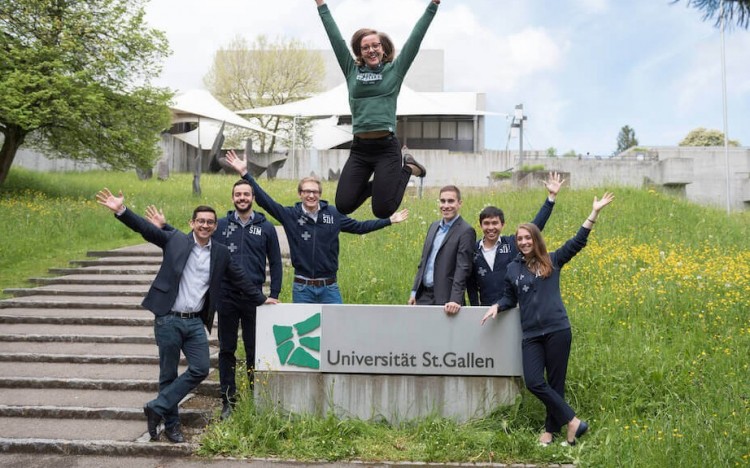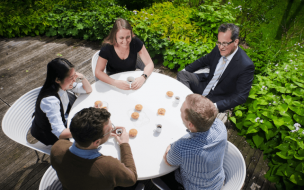It also has the highest density of Fortune 500 company headquarters in the world, with banking and finance as key industries employing 5.4% of the population in 2017. This all makes it a prime location for students to launch burgeoning business careers.
Here are five reasons why you should study your master’s in management in Switzerland:
1. The location
Switzerland sits at the the center of Europe, with incredible views of the Alps and rolling wild flower meadows which attract visitors from around the world.
Layla Said (pictured below, right) was drawn to Switzerland by the Masters in Strategy and International Management (SIM) at the University of St. Gallen—ranked the best master’s in management in the world by the Financial Times in 2018.
Current SIM student Layla adds that she loves the location, being able to hop on a train and be in a different country so quickly. It also offers graduates access to multiple countries when launching careers after the SIM program.
Indeed, according to data from the Financial Times, 55% of students from the SIM program change country for work after graduating.
2. The network
With four countries on the doorstep, Switzerland is a juncture between Germany, France, Austria, and Italy. In fact, nearly a quarter of Swiss inhabitants are from other countries.
Shade Danielyan, another current SIM student, says she is enjoying meeting people from different industries as part of the program, highlighting that networking opportunities with people from Google and McKinsey are setting her up well for her post-master’s career.
The SIM program also has an exclusive corporate partnership with the Boston Consulting Group (BCG), who offer workshops, lectures, and internship opportunities.
© St. Gallen University
3. A culture of collaboration
Shade explains that, as someone who likes organization and planning, she fits in well with the culture of Switzerland. Studying in a setting which runs like clockwork also helps make a more productive learning environment.
Productive learning on the SIM program is enhanced by the collaboration at the school, explains Shade.
Teamwork is an important part of the Masters in Strategy and International Management classroom environment, bolstering the master’s theory. Shade says that she’s learnt how to successfully work in a group with many dominant personalities, and that the SIM program allows everyone to develop as a leader in their own way.
She thinks this is a particularly valuable aspect of the program. “You know what they say, soft skills can be the hardest to learn,” she adds.
Newly incoming SIM students are also given the chance to have a current SIM student mentor, as part of the SIM Buddy initiative. This is further driven by the SIMopoly scheme, an icebreaker that focuses on collaboration between diverse groups of students.
The SIM classroom is a melting pot of diversity, with 49 students represented by 28 nationalities, and 90% international students joined by 10% Swiss nationals. There is also a strong gender split, with 51% female students, and 49% male.
© St. Gallen University
4. An entrepreneurial environment
“I have classmates who are already working on their own business idea—there’s definitely an atmosphere of entrepreneurship,” explains Shade.
Switzerland has indeed topped the Global Innovation Index since 2013, and is among the top ten most entrepreneurial countries, with a particularly strong standing in finance, commercial infrastructure, tertiary education, knowledge, and technology transfer.
Shade (pictured below, right) herself says she wanted to pursue the Masters in Strategy and International Management at St. Gallen to help propel her towards her ambition of founding her own investment bank in Armenia, to improve financial prosperity for the country.
5. The passion for social impact
According to Layla, St. Gallen approaches teaching with a holistic approach where professional development is important, but only in conjunction with shaping students into socially minded members of a global community.
The SIMagination project, a compulsory course that all SIM students partake in and organize themselves in groups, was a huge draw of the program for both Layla and Shade, they say. One facet of the course involves planning and executing a sustainable social impact project.
Layla worked with a refugee program in Greece which was partnered with an NGO.
“The aim is to positively impact a community in need, but I think that the most profound impact was on us,” she says.
“The network of the SIM and the SIMagination project is like an extended family to me now.”











